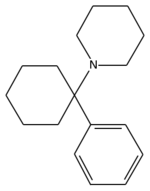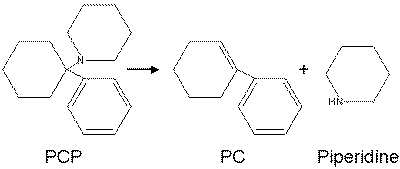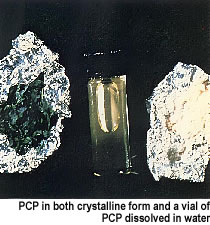| Phencyclidine | |
 |
|
| Chemical formula | C17H25N |
| Molar mass | 243.387 g mol−1 |
| Systematic name | 1-(1-phenylcyclohexyl)piperidine |
Phencyclidine (a contraction of the chemical name phenylcyclohexylpiperidine), abbreviated PCP, is a dissociative drug formerly used as an anesthetic agent, exhibiting hallucinogenic and neurotoxic effects.
PCP was commercially developed in the 1950s by the Parke-Davis pharmaceutical company. PCP is listed as a Schedule II drug in the United States under the Convention on Psychotropic Substances.[1]
Contents |
Chemistry and pharmacology
Chemically and pharmacologically it is a member of the family of dissociative anesthetics, which also includes ketamine, tiletamine and high doses of dextromethorphan. Although the primary psychoactive effects of the drug only last hours, total elimination from the body is prolonged, typically extending over weeks.
Toxicology
PCP is a neurotoxin. It is more toxic than other dissociatives and its toxicity is more complex. The damages concern different brain regions and probably affect diverse receptor systems.[2] [3]
Medical and veterinary use
PCP was first tested after World War I as a surgical anaesthetic. Because of its adverse side-effects, it was shelved until the 1950s. It was then patented by Parke-Davis and named Sernyl (supposedly referring to serenity), but was again withdrawn from the market because of side effects. It was soon renamed Sernylan, and marketed as a veterinary anaesthetic, but again discontinued. Its side effects and long half-life in the human body made it unsuitable for medical applications. It is retained in fatty tissue and is broken down by the human metabolism into PCHP, PPC and PCAA. When smoked, some of it is broken down by heat into 1-phenyl-1-cyclohexene (PC) and piperidine.

Recreational use
PCP is consumed recreationally, mainly in the United States[citation needed], where the demand is met by illegal production. The drug is sold in an extremely limited number of cities, such as Washington, DC and Los Angeles[citation needed]. It is available as a liquid (PCP base dissolved most often in ether), but typically it is sprayed onto leafy material such as marijuana, mint, oregano, parsley or Ginger Leaves, and smoked. It is sometimes taken with Ecstasy -- a practice known as "Elephant flipping". PCP is a Schedule II substance in the United States and a Class A substance in Great Britain.
Biochemical action
The N-methyl-D-Aspartate (NMDA) receptor, a type of ionotropic receptor, is found on the dendrites of neurons and receives signals in the form of neurotransmitters. Ingestion of PCP causes prolonged depolarization of the neuron.
Method of absorption

The term "embalming fluid" is often used to refer to the liquid PCP which a cigarette or joint is dipped in, to be ingested through smoking. Smoking PCP is known as "getting wet." There is much confusion over the practice of dipping cigarettes in "embalming fluid" leading some to think that real embalming fluid may actually be used. This is a misconception that may cause serious health consequences beyond those of consuming PCP.
In its powder form, PCP can be insufflated (snorted).
In its pure form, PCP is a white crystalline powder that readily dissolves in water. However, most PCP on the illicit market contains a number of contaminants as a result of makeshift manufacturing, causing the color to range from tan to brown, and the consistency to range from powder to a gummy mass.
Effects
Whether PCP has any strong and consistent effects which are markedly different from other similar compounds is controversial. Some think that the drug's effects are as varied as its appearance. It may be that a moderate amount of PCP will cause users to feel detached, distant, and estranged from their surroundings. Numbness, slurred speech, and loss of coordination may be accompanied by a sense of strength and invulnerability. A blank stare, rapid and involuntary eye movements, diarrhea, and an exaggerated gait are alleged to be among the more observable effects. PCP can sometimes elevate body temperature, which is why many people under the influence of PCP have been known to shed clothing in public places. Acts of violence have been committed by people high on the drug; a well-known example is Brenda Ann Spencer, who claimed to have committed her school massacre while under the influence of alcohol and PCP.
According to the National Institute on Drug Abuse: at high doses of PCP, blood pressure, pulse rate, and respiration drop. This may be accompanied by nausea, vomiting, blurred vision, nystagmus, drooling, loss of balance, and dizziness. High doses of PCP can also cause seizures, coma, and death (though death more often results from accidental injury or suicide during PCP intoxication). High doses can cause symptoms that mimic schizophrenia, such as delusions, hallucinations, paranoia, disordered thinking, a sensation of distance from one’s environment, and catatonia. Speech is often sparse and garbled.
References in Popular Culture
- More so than any other illegal substance, PCP has
developed an elaborate mythological history surrounding
itself, spread by sources such as D.A.R.E. PCP is said
in an urban legend to cause intensely realistic
hallucinations, e.g. of spiders engulfing the user's
face, causing the user to injure himself in an attempt
to remove them. In reality such effects are more like
those of a deliriant.
Among police and firefighters, PCP is treated as a menace. Individuals on PCP are treated almost as bogey-men in personal safety lectures that are loaded with stories involving people on PCP chasing down cars and breaking through walls because they are unable to feel pain.
One of the street thugs in the Charles Bronson film Death Wish II was portrayed as a PCP user - the scene where he assaults several police officers is reminiscent of an NFL wide receiver evading linemen.
Another famous mention is in the movie Terminator, where the violent attacks by the character played by Arnold Schwarzenegger, including punching through a windshield without feeling it, are attributed to PCP by the police.
In an NCIS episode, a supermodel was found dead with PCP in her system.
In 1981's "Angel Dusted", and again in 1982's "Desperate Lives", characters played by actress Helen Hunt tangle with PCP. After taking PCP in "Angel Dusted", she jumps out a closed second-story window and then gets up and starts scraping her arm violently with a shard of glass.
American Musician Antron Singleton committed murder and cannibalism while under the effects of PCP.
On Chappelle's Show, Dave Chappelle is offered PCP by Wayne Brady, which Dave refuses until he is threatened by Wayne (this being a parallel to the movie Training Day.) PCP references abound in the series (perhaps because of Chappelle's upbringing in Washington, D.C., which as mentioned above, is one of the few PCP epicenters in the US)--The World Series of Dice is played by a diceman, Grits n' Gravy, who spends all his winnings on PCP. In the same sketch, one of the characters is named "Ashy Larry," which is slang for PCP. The "angel" in the sketch "It's A Wonderful Chest" attributes his powers to PCP. Also, the character Tyrone Biggums, in his first appearance on the show when he visits a classroom full of schoolchildren to tell them of the dangers of drug use, mentions that he has smoked marijuana laced with "embalming fluid" (see above).
In the 1995 film "Friday", Chris Tucker's character Smokey mistakenly smokes PCP and develops a twitch that he carries throughout the movie.
Faith No More has an album titled Angel Dust. It was released in 1992.
Butthole Surfers released the Live PCPEP in 1984.
The popular Jackass cast member "Steve-O" documented his 5-day 'trip' on PCP on his DVD "PCP Saved my Life". He precedes the showing of the tape with an announcement, saying he will never watch the tape of his 'trip', and that he will never take PCP again, he remembers no part of the 5-day trip in which he frequently proclaims that PCP has saved his life.
In Thomas Harris' novel Hannibal, it is described that one of Hannibal Lecter's victims, Mason Verger, performed self-mutilation whilst under the influence of phencyclidine and other drugs that Lecter drugged him with.
In the second season of the television show Buffy the Vampire Slayer, in the episode School Hard, the principal of the high school covers up a vampire attack by claiming that the attackers were "gang members on PCP."
In the first manga episodes of City Hunter, Ryo Saeba confronts a syndicated crime group called Union Theope, which uses phencyclidine on some of its agents in order to make them more invulnerable.
In the 1983 movie Trading Places, Dan Aykroyd is framed for selling PCP.
'The Simpsons' featured an episode in which Marge is incorrectly drug-tested positive for "crack and PCP".
Tupac Shakur mentions PCP in his song "I Ain't Mad at Ya" - "...standin' on the block, wit ya glock, trippin' off sherm..." He also mentioned it in "Hit 'Em Up" - "Smokin' dope, it's like a sherm high/niggas think they learned to fly" and Me & My Girlfriend -"Smokin' sherm drinking malt liquor/father forgive her" (As noted above, "sherm" is a slang name for PCP.)
Notorious BIG refers to PCP in his song Notorious Thugs and its remix Spit Your Game- "Ain't too many can bang with us/straight up weed no angel dust". He also refers to it in 'Gimme the Loot' - Crazier than a bag of fucking angel dust.
In Jonathan Caouette's film "Tarnation", he is said to have smoked a PCP-laced joint as a teenager.
In the System of a Down song "Stealing Society" from the album Hypnotize there is a lyric "crack pipes, needles, PCP and fast cars, kinda mix really well with a dead movie star."
In the Beastie Boys song "3 Minute Rule" from the album Paul's Boutique there are lyrics by Adrock in which he says, "so peace out y'all, I'm PCP, so I'm out, full throttle to the bottle and full full clout, and I'm out." The Beastie Boys often refer to being 'dusted' in their lyrics, slang for being high on PCP.
PCP was seen on the television show COPS when a bleeding, naked man punched a hole in a fence and was tackled by many police officers.
The punk band NOFX released a song on the "Fuck the Kids" album - Eric Melvin VS PCP. Eric Melvin being the bands guitarist.
The British pop band Right Said Fred released a song named "Angel Dust" on their 2001 album "Fredhead", in which a woman is compared to the effects of the drug.
In episode 49, the third episode of the third season, of CSI a high school student kills and eats parts of another girl while under the effects of PCP.
Ghostface Killah often references PCP in his songs such as in Who Are We "...see me in New Orleans, start puffin' on 'sherm" in Apollo Kids "...two culture-ciphers, one bag of wet", the song Ghostface "...now Daddy's blowin' sherm and Remi".
The British Rock/Electronic band New Order had a track called "Angel Dust" on their Brotherhood album.
Mitch Hedberg used a joke in which he elaborated on a physical he was required to take to perform on Comedy Central Presents. "To do this show I had to take a physical. They asked me a bunch of medical questions, and they were like, yes or no questions, but they were very strangely worded. Like 'Have you ever tried sugar... or PCP?"
Calling themselves the "Leak Bros.", rappers Tame One and Cage released an album entitled Waterworld in 2005 on Eastern Conference Records. The entire album was devoted to PCP. "Leak" or "Leaky Leak" is slang for PCP laced marijuana.
In the popular urban movie Training Day, Ethan Hawke's character smokes marijuana laced with PCP and goes into a stupor-like dream state where everything slows down and the environment changes color.
Welsh rock band Manic Street Preachers have a song called P.C.P., released as part of a double A-side single, and on their album The Holy Bible.
The British metal band Venom released a song named "Angel Dust"
The PCP in a game called XEvil actually does cause temporary invulnerability and increased strength. However, abusing the drug causes death by overdose.
There is a German power metal band named Angel Dust.
See also
External links
- The Vaults of Erowid
- The Straight Dope: Does PCP turn people into cannibals?
- National Institute of Drug Abuse InfoFacts: PCP (Phencyclidine)
- A CNN report on an individual hospitalized while on PCP
- Link page to external chemical sources.
References
- ^ "List of psychotropic substances under control, in accordance with the Convention on Psychotropic Substances of 1971": Report from 2003 (pdf)
- ^ R. Nakki et al. (1995): "Cerebellar toxicity of phencyclidine", J. Neurosci. Seite 2097-108
- ^ F.R. Sharp et al. (1994): "Neuronal injury produced by NMDA antagonists can be detected using heat shock proteins and can be blocked with antipsychotics", Psychopharmacol. Bull. 30 (4), 555-60




 216.73.216.133
216.73.216.133 User Stats:
User Stats:
 Today: 0
Today: 0 Yesterday: 0
Yesterday: 0 This Month: 0
This Month: 0 This Year: 0
This Year: 0 Total Users: 117
Total Users: 117 New Members:
New Members:
 216.73.xxx.xxx
216.73.xxx.xxx
 Server Time:
Server Time: